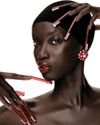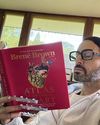
There is no script for first ladies in wartime, and so Olena Zelenska is writing her own. The wife of Ukrainian president Volodymyr Zelenskyy, a longtime comedy writer, always preferred to stay behind the scenes, while her husband, a comedian turned politician whose presidency may yet determine the fate of the free world, glowed in the limelight. But ever since Russia invaded Ukraine on February 24, Zelenska has found herself center stage in a tragedy. When I met her on a rainy summer afternoon in Kyiv, where cafés were busy even amid frequent air-raid sirens, her luminous face and green-brown eyes seemed to capture the range of emotions coursing through Ukraine today: deep sadness, flashes of dark humor, recollections of a safer, happier past, and a steely core of national pride.
“These have been the most horrible months of my life, and the lives of every Ukrainian,” she said, speaking her country’s language through a translator. “Frankly I don’t think anyone is aware of how we have managed emotionally.” What inspires her, she told me, is her fellow Ukrainians. “We’re looking forward to victory. We have no doubt we will prevail. And this is what keeps us going.”
I met Zelenska—surnames are gendered in Slavic languages—deep inside the presidential office compound, a heavily guarded place I had traveled long hours to reach. With Ukraine’s airspace closed to flights, I took a train from Poland, through landscapes that have seen some of the 20th century’s worst horrors. Once inside the compound, I passed security checkpoints and a labyrinth of blacked-out corridors full of sandbags and soldiers. Life in wartime.
هذه القصة مأخوذة من طبعة October 2022 من Vogue US.
ابدأ النسخة التجريبية المجانية من Magzter GOLD لمدة 7 أيام للوصول إلى آلاف القصص المتميزة المنسقة وأكثر من 9,000 مجلة وصحيفة.
بالفعل مشترك ? تسجيل الدخول
هذه القصة مأخوذة من طبعة October 2022 من Vogue US.
ابدأ النسخة التجريبية المجانية من Magzter GOLD لمدة 7 أيام للوصول إلى آلاف القصص المتميزة المنسقة وأكثر من 9,000 مجلة وصحيفة.
بالفعل مشترك? تسجيل الدخول

FINAL CUT
\"WE WANT YOU TO GO FOR IT!\" ANNA TOLD ME

SCREEN TIME
Three films we can't wait to see.

Impossible Beauty
Sometimes, more is more: Surreal lashes and extreme nails put the fierce back in play

Blossoms Dearie
Dynamic, whimsical florals and the humble backdrops of upstate New York make for a charming study in contrasts.

HOME
Six years ago, Marc Jacobs got a call about a house designed by Frank Lloyd Wright. Making it his own, he writes, would be about love, commitment, anxiety, patience, struggle, and, finally, a kind of hard-fought, hard-won peace.

GIRL, INTERRUPTED
Anna Weyant found extraordinary fame as an artist before she had reached her mid-20s. Then came another kind of attention. Dodie Kazanjian meets the painter at the start of a fresh chapter

ROLE PLAY
Kaia Gerber is someone who likes to listen, learn, read books, go to the theater, ask questions, have difficult conversations, act, perform, transform, and stretch herself in everything she does. That she's an object of beauty is almost beside the point.

CALLAS SHEET
Maria Callas's singular voice made her a legend on the stage. In a new film starring Angelina Jolieand on the runwaysthe romance continues.

BOOK IT
A preview of the best fiction coming

GLOBAL VISTAS
Three new exhibitions offer an expansive view.